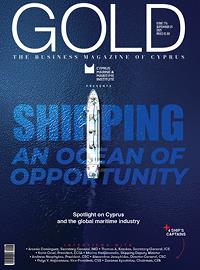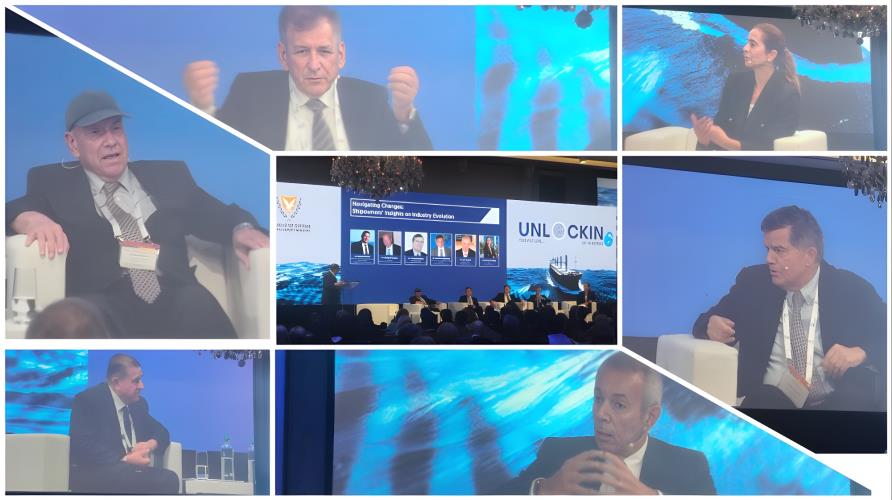Global shipping leaders gathered at Maritime Cyprus 2025 to deliver a clear message to policymakers: the industry supports decarbonisation but rejects what they call “taxation disguised as green policy.”
A panel entitled ‘Navigating Changes: Shipowers’ Insights on Industry Evolution,’ featured five of the sector’s most influential voices — George Procopiou (Chairman, Dynacom Tankers Management), Semiramis Paliou (CEO, Diana Shipping), Dr John Coustas (President & CEO Danaos Corporation), Thanassis Martinos (Managing Director, Eastern Mediterranean Maritime) and Andreas Hadjiyiannis (CEO, Cyprus Sea Lines/ Hellenic Tankers, President, immediately preceeding Cyprus Union of Shipowners). Together they examined greenhouse-gas (GHG) regulation, alternative fuels and the impact of European climate measures on global trade.
Efficiency before penalties
Opening the session, George Procopiou revived a proposal he first made eight years ago — to cut average vessel speeds by two knots.
“At the time it was dismissed, yet it remains the simplest and most effective way to halve emissions,” he said.
Procopiou noted that today’s vessels are 35 percent more efficient than a decade ago and, when operated at lower speeds, can cut emissions by as much as 65 percent.
Andreas Hadjiyiannis underscored shipping’s small environmental footprint.
“Only about one part per million of atmospheric CO₂ comes from ships,” he said. “We already operate at maximum efficiency; further taxation won’t change the planet’s temperature.”
Emission schemes under fire
Speakers sharply criticised the EU Emissions Trading System (ETS) and similar measures.
Thanassis Martinos described the ETS as “just taxation” that ultimately drives up consumer prices.
“Even vessels spending minimal time in European waters are penalised. It’s a distortion of competition, not a climate solution,” he argued.
Dr John Coustas was equally direct: “It’s like telling a doctor how to perform surgery. The ETS has already cost us millions and has achieved nothing tangible for the environment.”
Semiramis Paliou offered a more nuanced perspective. “Decarbonisation is expensive, but these mechanisms are intended as catalysts to bridge the cost gap between carbon and alternative fuels,” she said.
She warned, however, that fragmented regional regulation would be “a disaster,” urging instead for a coordinated global framework under the International Maritime Organization (IMO).
Uncertain course for future fuels
All panelists agreed there is no single “fuel of the future.”
Paliou revealed that Diana Shipping has two methanol-ready vessels on order but cautioned against locking in technology too early:
“No one wants stranded assets.”
Coustas confirmed that Danaos is also building methanol-ready ships, calling green methanol the most scalable near-term option thanks to Chinese production capacity, while labelling LNG “a costly transitional choice.”
Procopiou pointed to continued gains in ship design, while some panellists predicted that China will retain shipbuilding dominance, potentially followed by India and Vietnam as costs rise in East Asia.
Policy, politics and practicality
Frustration with policymaking ran through the session.
Panelists cited Germany’s nuclear phase-out and U.S. curbs on oil finance as examples of well-intentioned policies that backfired, increasing emissions and energy prices.
“Europe isn’t ready for this transition,” said Hadjiyiannis. “We need doable solutions, not symbolism.”
Procopiou predicted that on-board carbon-capture systems will soon make existing fleets far cleaner.
“Retrofits are coming — that’s good news for shipping and the planet,” he said.
Another panelist quipped, “Don’t be sure; they’ll find another way to tax us.”
Energy security and competitiveness
Looking ahead, Coustas argued that energy independence should outweigh political targets.
“Europe and China must pursue autonomy, not dependence on imported solutions,” he said.
Procopiou warned that AI, electric vehicles and global growth are fuelling unprecedented energy demand:
“We’ll need every available source — renewables, oil, gas and nuclear alike.”
Hadjiyiannis called the 2030 and 2050 net-zero deadlines unrealistic, while Procopiou added wryly:
“Hydrogen has been the fuel of the future for 50 years — and it still is.”
Procopiou closed with a stark calculation, “An LNG project costing $18 billion would need $11 billion more just for net-zero compliance — that’s not sustainable.”
He urged Europe to restore pragmatic relations with energy suppliers, including Russia.
Adding a national policy perspective, George Papanastasiou, Minister of Energy, Commerce and Industry of Cyprus, addressed the panel to draw parallels between maritime and energy policy. He noted that Europe’s Green Deal, while well-intentioned, has at times advanced faster than technological capability, impacting competitiveness across industries. Moreover, he argued that Europe must retain all available energy options, including oil, gas, renewables, nuclear, and coal, to ensure affordability and energy security.
“Energy and competitiveness go hand in hand,” he said, warning that transitions made without viable alternatives risk deepening inequality. His remarks were widely welcomed by the panel as a realistic and inclusive approach to the challenges ahead.
The discussion was moderated by George Mouskas, President, Olympia Ocean Carriers, Vice president, Cyprus Union of Shipowners.









